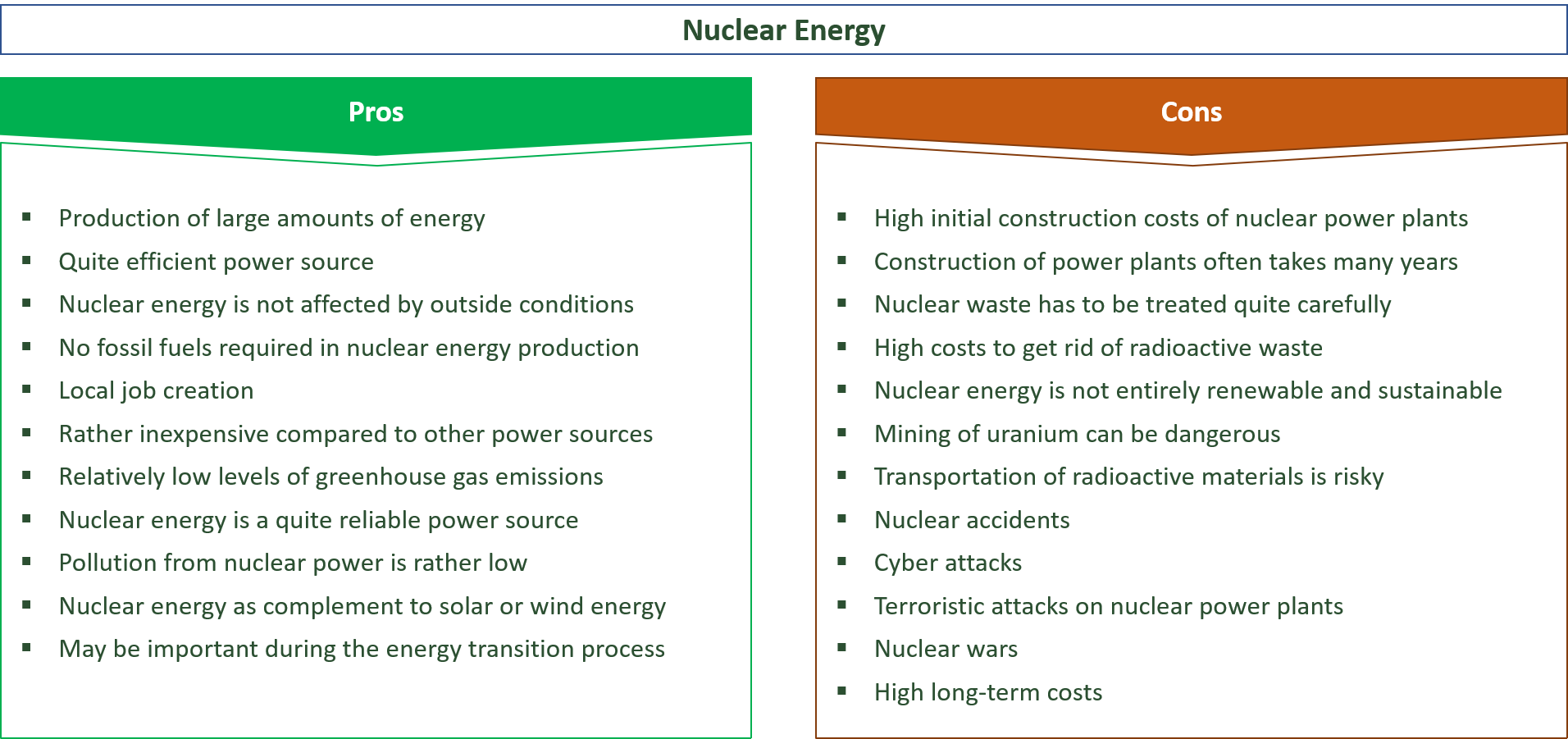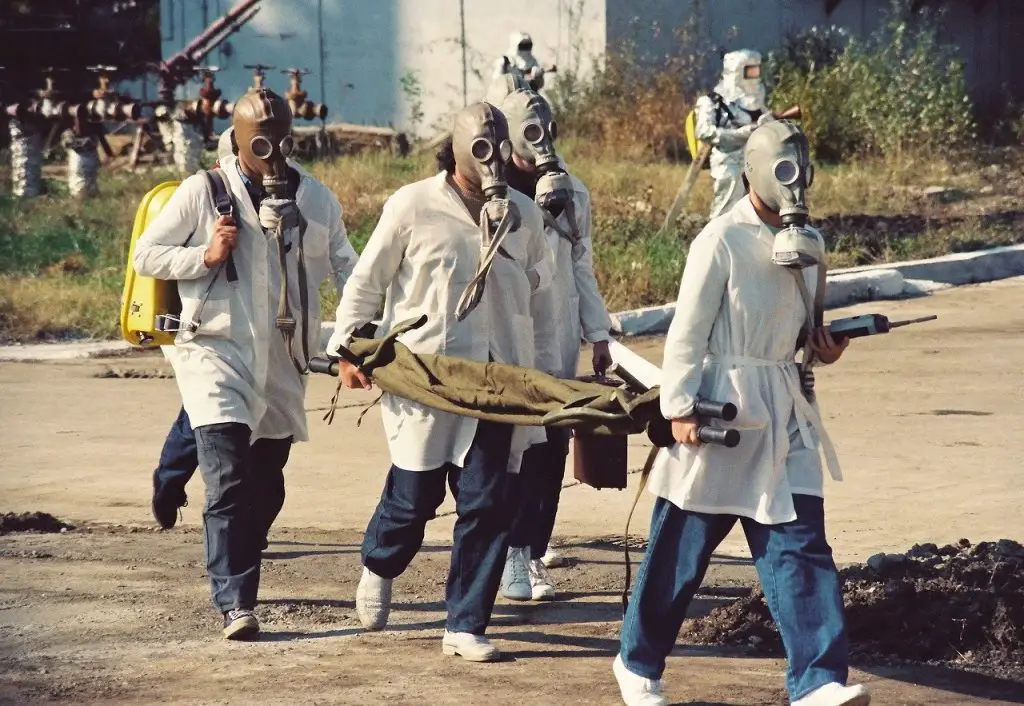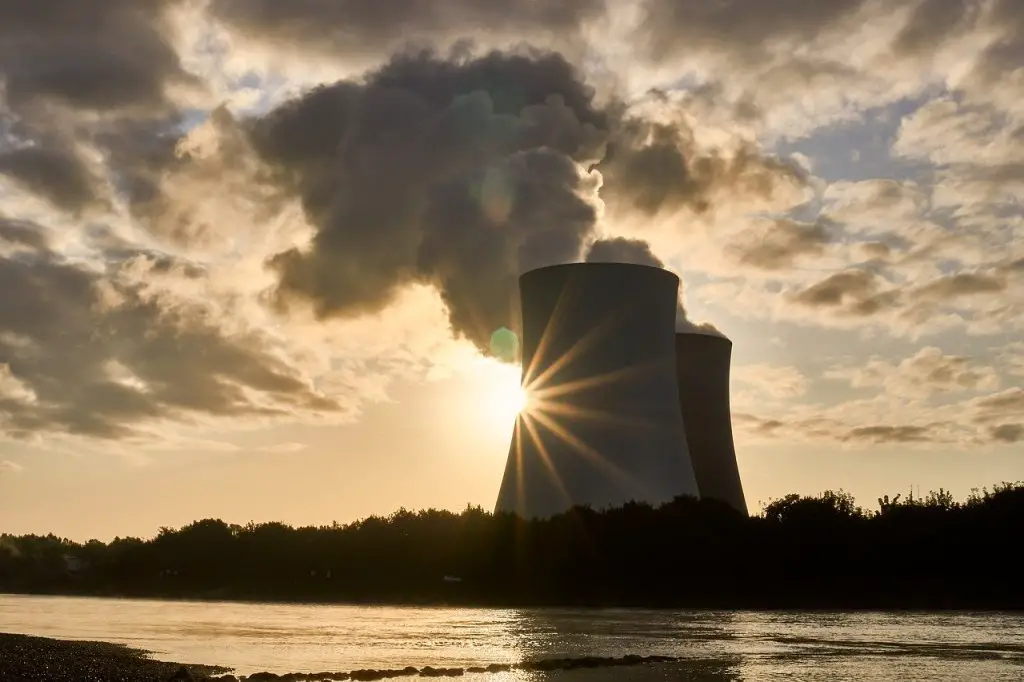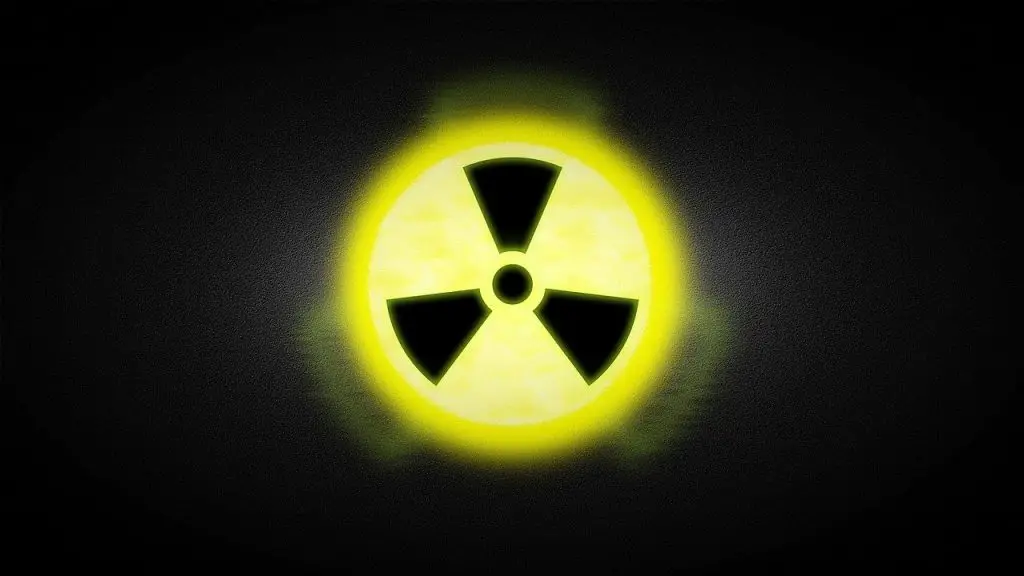“We should remember that there are nations which meet more than 30 to 60% of their power requirements through the nuclear power system.”
A. P. J. Abdul Kalam, Statesman
Advantages & Disadvantages of Nuclear Energy

Nuclear energy can be defined as energy that is generated through nuclear reactions.
Through those nuclear reactions, large amounts of heat are produced, which in turn are used in steam turbines in nuclear power plants to produce electricity.
Even though nuclear energy has several important advantages, there are also plenty of downsides related to nuclear power.
In this article, the pros and cons of nuclear energy are examined in detail.
Audio Lesson
Contents
How important is Nuclear Energy?
As at 2020, nuclear energy had been a quite important global energy source which accounted for around 10% of the overall energy production worldwide.
After coal, gas and hydropower, nuclear power had been on the 4th rank in the global power mix regarding the amount of energy produced.
How does the Future of Nuclear Energy look like?
Nuclear energy may play a significant role to ensure our energy supply for quite a while.
However, once solar, wind and other alternative energies become more sophisticated, nuclear power will eventually lose its importance on a global scale since those other green energies have more upsides compared to nuclear energy.
Therefore, we will likely see a steady decline in nuclear energy production over the next decades.

Advantages of Nuclear Energy
- Production of large amounts of energy
- Quite efficient power source
- Nuclear energy is not affected by outside conditions
- No fossil fuels required in nuclear energy production
- Local job creation
- Rather inexpensive compared to other power sources
- Relatively low levels of greenhouse gas emissions
- Nuclear energy is a quite reliable power source
- Pollution from nuclear power is rather low
- Nuclear energy as complement to solar or wind energy
- May be important during the energy transition process
Production of large amounts of energy
With the use of nuclear power plants, large amounts of energy can be produced each day.
Nuclear power plants can supply whole cities with energy without having to rely on other energy sources.
In our current society where almost all important devices rely on electricity and the per capita demand for energy increases at a steady rate, it is crucial that the general public is supplied by sufficient energy, which can be done through the use of nuclear power plants.
Quite efficient power source
Compared to other technologies, nuclear power is also quite efficient in terms of material input and power output.
Scientists concluded that nuclear power can be regarded a few thousand times more efficient compared to fossil fuels like coal when it comes to power production.
Thus, nuclear energy can be regarded as one if not the most efficient power source that humanity can use on a global scale.
Nuclear energy is not affected by outside conditions
In contrast to wind or solar energy, nuclear power does not rely on good weather or wind in order to work properly.
Therefore, it can be regarded to be independent of outside weather or other climatic conditions, which can ensure the energy supply of millions of people who live in regions where solar or wind power could not be produced in a consistent or sufficient manner.
No fossil fuels required in nuclear energy production
Another advantage of nuclear energy is that there are no fossil fuels needed in the energy production process.
Therefore, the use of nuclear energy instead of fossil fuels like coal for electricity production could fight resource depletion and may also mitigate several other issues related to the use of fossil fuels.
Local job creation
The nuclear power industry can also be a great source of jobs.
For instance, hundreds or even thousands of people are employed in nuclear power plants and the surrounding infrastructure.
Thus, especially for regions with high levels of unemployment, the construction of nuclear power plants may significantly improve the overall living and working conditions of the local population.
Rather inexpensive compared to other power sources
Nuclear energy can also be regarded as quite cheap compared to other power sources.
The unit price for energy that comes from nuclear power plants is usually much lower compared to alternative energies like solar or wind, but also compared to conventional energies from fossil fuels like coal since nuclear energy is much more efficient in terms of the ratio between material input and energy output.
Thus, by operating nuclear power plants, it is possible to supply the general public with cheap electricity on a large scale.
Relatively low levels of greenhouse gas emissions
Nuclear energy can also be regarded as superior in terms of greenhouse gas emissions compared to energy produced by conventional fossil fuels like coal or gas.
Through the reduction of greenhouse gas emissions, we could slow down global warming and the horrible effects related to it.
Thus, by using nuclear power instead of power from fossil fuels, the problem of climate change could be mitigated to a certain extent.
Nuclear energy is a quite reliable power source
Even though there have been plenty of minor accidents over time, nuclear power plants can still be regarded as a quite reliable power source that provided humanity with large amounts of electricity over the past decades.
Since it is not dependent on climatic conditions like other alternative energies, the power supply of the general public could be secured by using nuclear power plants for energy production.
Moreover, even if one nuclear power plant may have some issues and might be shut down, there are still many others left which could provide sufficient energy.
Pollution from nuclear power is rather low
Compared to other conventional energy sources like coal or gas, the pollution levels from nuclear power plants are rather low.
For instance, through the combustion of coal, large amounts of harmful gases are emitted into our atmosphere, which leads to significant air pollution and may also cause acid rain and other environmental issues.
In these terms, nuclear power can be regarded as much cleaner.
Nuclear energy as complement to solar or wind energy
Even though nuclear power may lose its importance over the long run, it might still be a valid complement to other green energies like wind or solar energy.
In times where solar or wind energy are not sufficient to meet our energy demand, nuclear power plants could be used to ensure the energy supply for the general public.
In times where the weather conditions are suitable to provide enough energy from green sources, the use of nuclear power plants could be reduced.
Thus, nuclear power could be a suitable complement to energy production with green technologies in the future.
May be important during the energy transition process
Nuclear power may play an important role when it comes to the energy transition process from fossil to renewable energy sources.
Since green energy is currently not sufficient to provide enough energy on a global scale, nuclear power plants may still be used in the transition process in order to ensure our energy supply.
Once the expansion of green energies is sufficient to provide all people on our planet with electricity, nuclear power plants could be shut down step by step.

Disadvantages of Nuclear Energy
- High initial construction costs of nuclear power plants
- Construction of power plants often takes many years
- Nuclear waste has to be treated quite carefully
- High costs to get rid of radioactive waste
- Nuclear energy is not entirely renewable and sustainable
- Mining of uranium can be dangerous
- Transportation of radioactive materials is risky
- Nuclear accidents
- Cyberattacks
- Terroristic attacks on nuclear power plants
- Nuclear wars
- High long-term costs
High initial construction costs of nuclear power plants
Even though the costs per unit of energy that is produced with nuclear power is quite low, the initial construction costs of nuclear power plants are quite high. It can cost billions of USD to build one nuclear power plant.
Although this costs will amortize over the lifespan of a nuclear power plant, especially in poor developing countries, these high initial costs may be quite daunting for local municipalities, which may lead to decide against the construction of a nuclear power plant even if it economically benefited the local economy and population in the long run.
Construction of power plants often takes many years
Another issue with nuclear power is that the construction of nuclear power plants may take several years from start to finish.
This is quite a long time compared to the construction of other sorts of power plants.
Thus, the expansion of nuclear power may be quite slow, especially in regions with a lack of know-how regarding the proper construction of those nuclear power plants.
Therefore, in regions where nuclear power does not play a major role right now, it will probably never play an important role anymore since those regions may rather rely on the transition from fossil fuels to renewable energy sources and may skip nuclear power in this process.
Nuclear waste has to be treated quite carefully
Unlike other sorts of waste, nuclear waste cannot simply be disposed into landfills or burned.
It has to be handled with great care since already small amounts of nuclear waste could significantly contaminate our environment.
Especially in countries with lax regulations regarding waste disposal, the improper handling of nuclear waste may lead to the death of many people and may also significantly hurt the local flora and fauna.
High costs to get rid of radioactive waste
Nuclear waste does not only have to be handled with great care, it is also quite costly to get rid of this waste.
Since it cannot be disposed of and processed like conventional waste, special processes had to be invented in order to get rid of radioactive waste in a suitable manner.
Nuclear waste is often buried hundreds of meters in the ground or disposed of in remote mountain areas with the hope that the radioactive waste eventually decomposes into harmful materials over time.
However, this decomposition process may take hundreds or even thousands of years.
Thus, areas where radioactive waste is decomposed may not be suitable for human use for a quite long period of time.
Nuclear energy is not entirely renewable and sustainable
Contrary to popular beliefs, nuclear energy is not an entirely renewable resource.
The uranium that is currently used for energy production in power plants is estimated to become depleted over the next centuries if we continue to use it for energy production purposes in the current manner.
However, scientists do plenty of research on new technologies regarding nuclear fusion.
New technologies may make uranium obsolete and may use other radioactive elements like thorium, which may last much longer.
However, even with new sophisticated technologies, our radioactive materials may become depleted in the long run.
Thus, nuclear energy cannot be regarded as a sustainable technology and the transition to fully renewable energy sources is crucial for humanity to ensure our global energy supply in perpetuity.
Mining of uranium can be dangerous
Not only the disposal of nuclear waste is quite problematic, also the initial production and mining for uranium can be quite dangerous, both to workers but also for the local flora and fauna.
If there are leaks or other issues related to uranium mining, large areas of land may be contaminated by nuclear materials and may become unsuitable for human use for quite a long time.
Moreover, if miners are not protected properly, they may also become contaminated and may eventually die due to the contamination with radioactive materials.
Transportation of radioactive materials is risky
Not only the mining process itself, but also the transportation of nuclear materials over long distances poses significant risks for our environment.
There could be several kinds of accidents related to the transportation of nuclear materials.
Transportation vehicles may leak, which may cause radioactive materials to contaminate our environment.
Moreover, accidents may lead to the release of large amounts of nuclear material into nature, which may not only hurt our local flora and fauna, but may also significantly pollute our groundwater.
Nuclear accidents
There had been horrible nuclear accidents in the past, which caused the death of many people, not only for those who lived close to the accident areas, but also for people who lived hundreds or even thousands of miles away since the wind can carry nuclear materials over quite long distances, which may lead to the contamination of large areas of land.
For instance, due to the Chernobyl accident in 1986, large areas of land have become contaminated.
Even in Western Europe, thousands of miles away from where the nuclear accident happened, it is still not recommended to eat local mushrooms since they may still be contaminated with radioactive materials.
Cyberattacks
In our current age, cyberattacks pose a big problem, not only to private companies, but also to nuclear power plants.
Experts fear that IT-specialists may be able to take control of the nuclear power plants.
Depending on the intention of those hackers, this might lead to serious issues.
It may also lead to the breakdown of the local power supply if hackers are able to shut down power plants.
Terroristic attacks on nuclear power plants
Terrorists may also see nuclear power plants as a suitable target since they could harm many people by attacking those power plants.
On the one hand, they could interrupt the public energy supply.
However, on the other hand, they might be able to cause severe nuclear accidents, which may lead to serious contamination of large areas of land.
Thus, in order to prevent those attacks, significant amounts of money have to be used by the nuclear power industry, which in turn may increase the price for nuclear energy for the general public.
Nuclear wars
Even though nuclear power plants are meant to produce electricity for the general public, they might also be used by governments to produce nuclear weapons.
Nuclear weapons can be regarded as one of the greatest threats to humanity, since a nuclear war might wipe out humanity in a quite short period of time.
Therefore, relying on nuclear energy, even if it is only meant to provide energy for the general public, might not be a good idea since those power plants may be misused for the production of nuclear weapons.
High long-term costs
The cost-benefit analysis is often done for a quite short period of time and the significant negative long-term effects are often overlooked in those analyses.
For instance, it has to be taken into account that the disposal of nuclear waste will make large areas of land unsuitable for human use for a quite long time.
Moreover, the disposal of nuclear waste may also hurt many animals and plant species.
Thus, there are vast long-term costs related to nuclear energy production, even though many studies miss to address those issues in a proper manner.

Nuclear Energy Pros & Cons – Summary List
| Nuclear Energy Pros | Nuclear Power Cons |
|---|---|
| Production of large energy amounts | High initial construction costs |
| Efficient power source | Power plant construction can take years |
| Not affected by outside conditions | Production of hazardous nuclear waste |
| No fossil fuels required | High costs to get rid of nuclear waste |
| Job creation | Not entirely renewable energy source |
| Rather inexpensive unit energy price | Mining for uranium can cause problems |
| Low greenhouse gas emissions | Risky transportation of nuclear materials |
| Reliable energy source | Cyberattacks |
| Low pollution levels | Terroristic attacks |
| Complement to other alternative energies | Nuclear wars |
| Important during the energy transition process | Long-term costs may be quite high |
Conclusion
Nuclear energy has been an important energy source over the past decades.
However, it may lose its importance in future decades since it is not entirely sustainable and implies other serious issues.
Thus, nuclear power may play a role in the transition process from fossil to renewable energies.
Yet, after this transition has been successful, chances are that our global society will rather rely on solar, wind or other alternative energies which can be considered to be greener and fully renewable.
Sources
https://en.wikipedia.org/wiki/Nuclear_power
https://www.britannica.com/technology/nuclear-power
https://www.nationalgeographic.org/encyclopedia/nuclear-energy/

About the author
My name is Andreas and my mission is to educate people of all ages about our environmental problems and how everyone can make a contribution to mitigate these issues.
As I went to university and got my Master’s degree in Economics, I did plenty of research in the field of Development Economics.
After finishing university, I traveled around the world. From this time on, I wanted to make a contribution to ensure a livable future for the next generations in every part of our beautiful planet.
Wanna make a contribution to save our environment? Share it!
